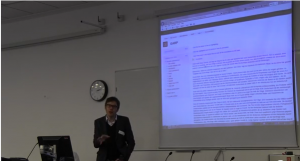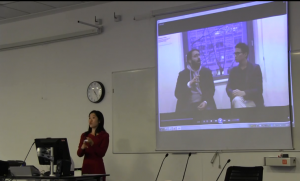Details of forthcoming workshops and links to LTI workshop resources and presentations.
Learning Technology Ideas Exchange
“Learning Technology Ideas Exchange” is an opportunity to get inspired, meet colleagues, exchange ideas and discover ways to improve teaching and learning with technology!
Run as informal café-style presentations, LSE colleagues will share insight into technologies used for teaching and learning and explain the educational rationale behind their work. You will have the opportunity to ask questions and discuss.
Posters from various LTI projects will be on display during lunch, which will be provided by LTI. Learning Technologists will be available to answer any questions throughout the event.
There will be a further opportunity to ask questions in a plenary before we wrap-up.
Sign up to the event via the training system (please note this is an event for LSE Staff only)
| Time | Programme | Themes and presenters | |
|---|---|---|---|
| 11.00 -11.10 | Welcome | Tea and coffee provided | |
| 11.10 - 12.10 | Café 1 | Table 1 - e-assessment * Sara Geneletti (Statistics) * Elisabeth Grieger (Mathematics) | Table 2 - General Innovation * Francesco Panizza, (Government) * Kay Inckle (Sociology) |
| 12.10 - 12.20 | LTI Update | ||
| 12.20 - 13.00 | Lunch (provided) | ||
| 13.00 - 14.00 | Café 2 | Table 1 - Students as Producers * Jennifer Jackson-Preece (European Institute) *Catherine Xiang (Language Centre) | Table 2 - e-assessment * Edgar Whitley (Management) * Lourdes Hernandez-Martin (Language Centre) |
| 14.00 – 14.30 | Plenary | Group discussion and questions | |
| When | Monday 23rd May | ||
| Time | 11am -3pm | ||
| Location | Lower Ground of Parish Hall (PAR.LG.03) |
Summer of Student Innovation 2016
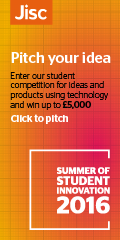 The Summer of Student Innovation (SoSI) project, run by Jisc, is a competition encouraging innovative education technology ideas from students. The initiative focuses on engaging with students to improve creative design, research, entrepreneurial and project management skills.
The Summer of Student Innovation (SoSI) project, run by Jisc, is a competition encouraging innovative education technology ideas from students. The initiative focuses on engaging with students to improve creative design, research, entrepreneurial and project management skills.
This year Jisc are running two competitions, a summary of both is below.
Student Ideas competition:
Jisc are seeking ideas for using technology that could improve research, learning or student life and have the potential for wide use across higher and further education.
Your idea might be a small tweak to how things work or a big solution for a whole college, university or other learning provider – but you will be required to show that it could have benefits beyond your own context.
The successful teams each gain an initial £2,000 plus mentoring through a design sprint, and a further £3,000 if we select their idea to be developed as a product.
Supporting tech startup projects:
The supporting technology startup projects competition is for small teams who would like to pilot their existing product within colleges, universities or skills providers.
A £20,000 startup grants will enable five successful teams to turn their working beta into a functioning product. Your product should be at least a working beta; we don’t expect that you will have an existing customer base but some evidence of pilots with learners would be beneficial.
Closing Date for submissions:
The deadline for submission of ideas is just under a month away on 23 May, 23:30h.
Further information on both competitions, how your students can submit their ideas and links to promotional material you can use are included on the Jisc website:
SADL Celebration: ending term on a digital high
 Last week saw the official end of the SADL Programme for 2015/16 and students and staff got together in the Studio in the Saw Swee Hock to report on their group projects, be presented with their certificates and prizes for the best blog posts and generally let their hair down before the end of term.
Last week saw the official end of the SADL Programme for 2015/16 and students and staff got together in the Studio in the Saw Swee Hock to report on their group projects, be presented with their certificates and prizes for the best blog posts and generally let their hair down before the end of term.
The evening started with each of the three groups discussing the research project they had been working on together since Michaelmas Term. Each group was supervised by three of our Senior Ambassadors and the projects included:
- how to improve learning spaces at LSE
- how to improve assessment and feedback and
- how to improve peer support.
The groups were given complete freedom in how they wanted to interpret the question and how to present their findings, however they were supported by the Seniors. The first group led by Djelila, Simran and Vikki were tackling the question of how to improve learning spaces at LSE. This is a really important question and the group highlighted some of the issues with the current learning spaces at LSE and how they felt they could be improved.
The next presentation was from Eugene, Katie and Chandra were investigating how to improve assessment and feedback at LSE. Again lots of issues were raised and the students had carried out a survey to gather the opinions from their peers about how improvements could be made.
Finally we heard from the group led by Geteesh, Chantel and Melissa who explored how peer support might be improved. The group talked about what peer support is and had lots of suggestions for how technology and face to face contact can build a peer network.
 Throughout SADL we encouraged students to blog about their experiences rewarding them with Amazon vouchers for their blog posts. We also had a prize for the best blog post over the course of the year and two runners up. We were looking for a reflective piece of writing, that emphasised digital literacy and shared ideas with others. The blog posts were judged by Valerie Brese who was a SADL student last year, Sierra Williams from LSE’s Impact Blog and Heather Dawson from the Library.
Throughout SADL we encouraged students to blog about their experiences rewarding them with Amazon vouchers for their blog posts. We also had a prize for the best blog post over the course of the year and two runners up. We were looking for a reflective piece of writing, that emphasised digital literacy and shared ideas with others. The blog posts were judged by Valerie Brese who was a SADL student last year, Sierra Williams from LSE’s Impact Blog and Heather Dawson from the Library.
We are delighted to announce the winner was Ella Sun for her blog post on OneNote or Evernote. The two runners up were Rebecca Quinn for her post on referencing, no longer a pain in academia and Djelila Delior who wrote about how SADL got me hired, who is also one of our Senior Ambassadors.
Congratulations to all the SADL students this year. They will all receive a statement on their PDAM record for their contribution to the programme and be eligible to apply to be a Senior Ambassador next year to help shape the programme.
Blog post written by Jane Secker (Digital Literacy and Copyright Advisor) and is taken from the SADL blog
Teachers: Make the Most of Reading Week!
Reading Week is meant to give LSE students time to consolidate on their learning by taking some time off their lessons or participating in workshops and other activities organised in their departments. Why don’t you too use it to consolidate your teaching skills?
NetworkED – James Clay – 9th March 2016
LTI NetworkED seminar series to welcome James Clay (Jisc) to LSE 9th March at 2pm. CANCELLED
Mapping Teaching and Learning
Mapping exercises such as those used to explore the concept of Visitors and Residents are a useful tool to understand where you currently are and to think about where you would like to be and how you are going to get there. The mapping exercise for Visitors and Residents in the main covers digital communication, collaboration and participation and can be used to help individuals build their digital capabilities in these areas.
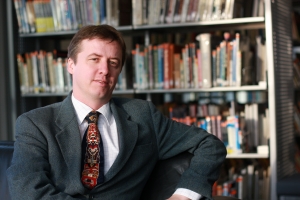
Tickets for this seminar can be found on Eventbrite.
Recently I have started to think about how we could use a similar concept to map teaching practices, learning environments and curriculum design. This lead onto thinking about mapping the “learning” of our learners. Where are they learning, is that learning scheduled and formalised? Is that learning ad-hoc? Is it individual, group, collaborative? Could we use mapping to help build capability in understanding how digital technologies can be used to enhance and enrich teaching, learning and assessment?
Mapping teaching and learning provides an insight into how the curriculum is designed and how learners interact and engage with the different spaces, tools and delivery mechanisms. It can also show how traditional methods of adding or blending learning technologies usually results in a bolt-on additional approach that results in a poor experience for learners and teachers.
The talk will reflect on how mapping the curriculum could result in a more coherent approach to the embedding of digital technologies and an approach that maximises the potential benefits of using digital over a scattergun approach of throwing technologies into a traditional mix of teaching and learning. This talk will discuss what we want to achieve through mapping teaching and learning, understanding that using digital is not necessarily a solution to every problem. It will also explore the potential enablers that will create new solutions, enable changes in behaviours and build digital capability.
References
White, David, and Alison Cornu. “Visitors And Residents: A New Typology For Online Engagement”. First Monday 16.9 (2011): n. pag. Web. 4 Feb. 2016.
Digital – Learning – Culture,. “Visitors & Residents”. N.p., 2014. Web. 4 Feb. 2016.
Donnalanclos.com,. “EDUCAUSE 2012, Part The Second | Donna Lanclos–The Anthropologist In The Stacks”. N.p., 2012. Web. 4 Feb. 2016.
Clay, James. “Mapping The Learning And Teaching”. e-Learning Stuff. N.p., 2016. Web. 4 Feb. 2016.
MacNeill, Shelia. “Some Reflections On “Mapping The Learning And Teaching”. howsheilaseesIT. N.p., 2016. Web. 4 Feb. 2016.
Biography
James Clay is currently on a 12 month contract with Jisc as their project manager for the building digital capability R&D project. James has worked in the further education (FE) sector since 1993 (as wells a short time in the museum sector) and has extensive experience in the use of technology to enhance and enrich learning. He has been a teacher, a project manager, a project director, an ILT manager, Learning Resources manager and an IT director. He has managed a range of projects over the years in various roles, including mobile learning, e-books, IT infrastructure, learner analytics, copyright, institutional resources, VLEs and student records
Book Tickets
As always the event is free to attend and places can be reserved via Eventbrite. All our talks are live streamed and recorded for those who can’t attend in person.
The LSE Language Centre Project Day
To celebrate the success of various teaching and research projects, the Language Centre hosted a Project Day on Friday 18th September. Several LSE Language Co-ordinators presented their experiences of experimenting with innovative technologies in language learning. The Day provided the opportunity to discuss the advantages and disadvantages of online learning systems, the merits of e-marking, and the ways in which video production can aid language learning.
The Day started with Dr Peter Skrandies (Language Co-ordinator: German) offering his views on how the online annotation of texts can assist traditional teaching methods. The benefits of this online learning system were clear to many Project Day attendees. The online annotation of texts by language teachers can compensate for limited contact hours. It also complements the learning objectives of in class activities. The development and use of the Moodle-integrated annotation tool was made possible through an LTI innovation grant and that the software tool was developed by Steve Bond from LTI.
On the other hand, one attendee suggested that this teaching method may only be appropriate for higher ability students. Dr Skrandies’ presentation reminds us that the use of online learning systems is not a ‘one size fits all’ solution.
In the context of UK Higher Education, language teachers often find it difficult to develop students’ grammar skills. Limited class teaching time and the pressure to develop communicative skills are just two of the challenges which language teachers face. In order to overcome these obstacles, Dr Lijing Shi (Assistant Language Co-ordinator: Mandarin) introduced Chinese Online Self-assessment (COS). COS is defined as a dynamic assessment that aims to assess potential for learning. It does not provide a static indication of achievement. COS carries a particular advantage. It enables teachers to quickly pinpoint gaps in students’ learning:
‘From my experience with level 5, COS is the quickest way for me to identify the problems students have in grammar or common mistakes made. I can then focus on specific areas of teaching to sort out these problems.’ Hongyi Xin, Co-ordinating Language Teacher (Mandarin)
As was the case with Dr Skrandies’ project, COS has certain drawbacks. The potential for technical hitches is problematic. Instead of focusing on language learning, Mandarin teachers may attend to the technical maintenance of COS, or liaise with IT services, when they could otherwise be planning seminar activities.
Towards the end of the Project Day, Dr Catherine Xiang (Language Co-ordinator: Mandarin) presented her project, titled ‘From Current Affairs in Mandarin to Students as Producers’. Dr Xiang emphasised the specific benefits of video production. Past students of Mandarin have produced short videos which allow them to focus on a topic related to the social sciences. However, these shorts film, interviews and documentaries are all conducted in Mandarin. The production of a TV style interview or short film provided students with the opportunity to gain confidence. By listening to their interview responses, students determined how much progress they have made. They could highlight areas for improvement, including pronunciation and grammar. However, Project Day attendees noted that this non-traditional form of learning was time consuming.
The final project was presented by Dr Xiang and Lourdes Hernandez-Martin Language Co-ordinator (Arabic) and Co-ordinator for Spanish Projects. They discussed their experimentation with e-marking. Approximately 60 participants (students and teachers) contributed to a pilot scheme. Programmes such as ‘iAnnotate’ and ‘Snagit’ were used. The benefits of using e-marking software were manifold. Students noted that having video and audio evaluation added clarity.
Assessed pieces of work could even be used for revision purposes:
“Video – it’s much better to hear something directly rather than having to try and work things out from comments or notes written down. Also allows things to be explained much more easily – you can learn from home, rather than having to come in for office hours.”
“The video feedback is very helpful especially for language courses because often ‘word’ feedback is not enough to understand grammatical mistakes. Besides, you can replay it for revision”.
On the other hand, e-marking carries certain complications. The ability to readily edit and review comments may incentivise teachers to add unnecessary advice which, ironically enough, may confuse students.
As the four projects discussed above demonstrate, use of language learning technology is not always a move in the right direction. Nevertheless, teaching staff at the LSE Language Centre continue to experiment with technology which can provide a diversified learning experience. Tailored according to individual teacher needs, technological innovations can significantly improve the teaching of Modern Foreign Languages in higher education.
——————————–
For more information on how LTI Grants can help your projects or to see what projects we have helped visit our Grants page on the blog.
LTI have just closed the first Grants call of the year however a second call will be announced in the near future.
Q&A with Bonnie Stewart
NetworkED seminar series 2016 kick starts next Wednesday (20 January) with Bonnie Stewart. The session will be streamed live and can be seen by clicking here.
Ahead of the session we asked Bonnie a few questions:

Tickets for this seminar can be found on Eventbrite.
Your work focuses on scholarly identities – can you tell us more about how academics use Twitter and how it might enhance their professional identity?
Like any aspect of identity it’s complex. The promotional narrative of “use social media! It’ll increase your circulation!” has some truth to it, but tends to miss the point or the value that longterm embedded users express…which is that Twitter enables and enriches their engagement and experience as scholars. The boost in audience is a bonus benefit rather than the core.
I think of identity in performative, fluid terms – as the aspects of self that make one recognizable to oneself, but also to others. We are part of a society and an academy where the personal/professional divide is blurring; where employment has become precarious and our roles and titles seldom serve any longer – if they ever did – as sufficient calling cards for who we are. Thus individual, personal means of signalling identity have become increasingly important…but also increasingly pervasive, with the rise of digital and especially social media.
So academics can use Twitter to present aspects of self that are varied and personal and playful as well as strictly professional, which can help build ties with others and expands networks. And even in a professional vein, the absence of gatekeeping around who gets to contribute to Twitter conversations can enable junior scholars and graduate students and thinkers who may not have much institutional status to become known for their ideas or their identity performance rather than their h-index or their institutional prestige. It’s an alternate door to professional identity, in a sense, with some very real implications for academia as a result.
Your most recent study uses ethnographic techniques, can you say more about why you think they are valuable in this context?
Ethnography looks at the meanings made by individuals in a given context, and analyses the relationships between that context and those meanings. It allows us to grapple with the culture and flavour of a particular moment, and understand how it’s experienced by the people who belong to it. Narratives and meaning-making are particularly useful, I think, for helping us understand experiences of inequality and marginalization, which aren’t always made visible with other methods. And in a world as hyped on data as ours currently is, it’s important that there be research that engages with the deep meanings constructed and enacted by small populations, as well as the big pictures that scale enables us to construct.
How do you encourage members of faculty who are very sceptical over the value of twitter that it is useful for academics?
First, I’d never tell someone they *should* use Twitter. I think it is entirely viable to have a robust academic life and career without Twitter. That said, I think the questions of audience and public engagement that the incursion of a space like Twitter open up for academia are important. So my approach is to explore *how* Twitter opens those up.
I think the primary value of a space like Twitter is that it is a) a relatively open network socially, allowing and encouraging people to engage with people they don’t already know, and b) lots of academics and educators use it. It’s that simple, really – it’s not so much any particular affordance of Twitter as that people are there and there are particular, if shifting, social norms that operate. So being on Twitter in a regular, present kind of way expands your access and your visibility to colleagues interested in the very same questions and ideas that you’re interested in, even if you’re located halfway across the world from each other. Without having to pay for a conference, or travel. And that once you find and curate and get involved in whatever “The Conversation” is for your field or area of interest, being present on Twitter offers ambient benefits, like relevant research literally floating across your feed, from known and trusted sources. It isn’t really a new model for academic engagement – it offers many of the same types of access and benefit that associations and conferences do, but 24/7, without the gatekeeping and cost. It’s immersive professional development.
Can you say something about why you consider Twitter to be a fraught space for open scholars?
Because Twitter operates as a relatively open network, as mentioned, it makes participants’ communications visible to people they may not already know. This is at the root of many of the benefits of Twitter for academics…new audiences, new contacts, new perspectives and resources…but it’s also at the root of new vulnerabilities. Two factors combine to create risk in this kind of open public space – first, the overarching phenomenon of callout culture, which can be wielded to challenge or protect particular orthodoxies, and second, the collapse of oral and literate cultural habits and audience expectations.
Twitter, from its inception, has operated primarily as an oral social sphere, but one in which the artifacts of that sociality are still persistent, replicable, searchable, and scalable, like all social media. Those artifacts can be searched, screen-captured, and spread to audiences for whom they weren’t intended, including media…so public speech – even if intended to be casual, social, and ephemeral – has complex consequences and can be fraught for participants.
NetworkED – Bonnie Stewart – 20th January 2016

Tickets for this seminar can be found on Eventbrite.
Academic Twitter: The Intersection of Orality & Literacy in Scholarship? presented by Bonnie Stewart.
Ahead of the seminar we’ve asked Bonnie a few questions.
The session will be streamed live on Wednesday 20th:
- Recording of Bonnie’s can be viewed here.
- Slides are available here
This presentation examines the intersection of Twitter and higher education, and how “academic Twitter” cultivates scholarly identities and forms of expression that differ from conventional institutional practices.
Based in a study using ethnographic methods and examining the practices and perspectives of a collection of globally-located scholars from across a range of academic status positions, the presentation explores the practices by which reputation and influence are cultivated on Twitter.
In open networks like Twitter, signals of scholarly reputation and influence are minimally codified, yet the influence scholars accrue intersects with institutional academia in grant-required measures of “public impact,” in media visibility, and in keynote and job opportunities.
The presentation outlines how both oral and literate traditions of communications (Ong, 1982) contribute to open, networked scholarly engagement on Twitter, and how these collapsed traditions trouble the terms of rank and bibliometric indexing which dominate the conventional concept of academic influence.
The presentation also lays out the operations of influence and reputation in this collapsed communications space, and theorizes its implications for scholarly engagement and higher education.
Finally, the presentation explores the complex logics of influence that networked scholars employ to assess the networked profiles and behaviours of peers and unknown entities, and suggests that the impression of capacity for meaningful contribution – key to cultivating influence and the regard of actively networked peers – may stem from successful navigation of the oral/literate collapse.
The substantive goal of the presentation is to offer a portrait of open, network scholarly influence and the practices that cultivate it, and to consider how the intersection of orality and literacy make academic Twitter a particularly fraught but beneficial place for engaged open scholars and educators.
As always the event is free to attend and places can be reserved via Eventbrite. All our talks are live streamed and recorded for those who can’t attend in person.
Lent Term Workshop Programme
LTI offers training sessions for staff in the following areas:
Learning Technology
Digital Literacy
Moodle
Click on the picture to download the full programme forLent Term 2016
Book your place through LSE’s training system
NetworkED – Maggie Philbin – 12/11/15
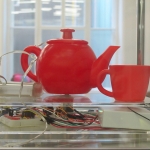 Tea,Tech and Teens …
Tea,Tech and Teens …
Introducing our next NetworkED seminar on Thursday 12 November at 3pm
When Maggie Philbin accepted a role on Tomorrow’s World in 1982, she had no idea what a life changing decision it would prove to be. Immersed in a high tech playground, meeting inspiring innovators behind the technology we all now very much take for granted, it was a dream job. It also gave her deep insight into what might make a difference to teenagers without any real understanding of where digital skills might take them and in 2008 the TeenTech initiative was born. TeenTech now work with over 4000 young people face to face every year, giving them opportunities to explore their own ideas, turning teenagers into powerful ambassadors for science and technology. Come and find out more. As Maggie says “It’s a great game but we need more people”
As always the event is free to attend and places can be reserved via Eventbrite.
All our talks are live streamed and recorded for those who can’t attend in person. For more information, check out our YouTube channel.


